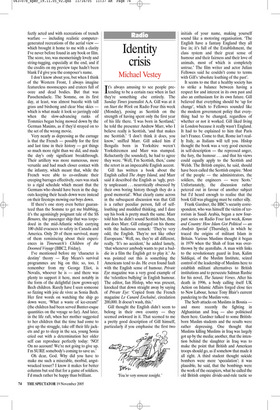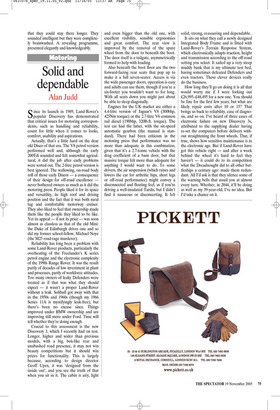Identity crisis
Michael Vestey
It’s always amusing to see people pretending to be a certain race when in fact they’re something else entirely. The Sunday Times journalist A.A. Gill was at it on Start the Week on Radio Four this week (Monday), posing as Scottish on the strength of having spent only the first year of his life there. ‘I was born in Scotland,’ he told the presenter Andrew Marr, who I believe really is Scottish, ‘and that makes me Scottish.’ ‘I don’t think it does, you know,’ sniffed Marr. Gill asked him if Bengalis born in Yorkshire weren’t Yorkshiremen and Marr was stumped. Reluctantly (he sounded), he had to agree they were. ‘Well, I’m Scottish, then,’ came the retort in an impeccable English accent.
Gill has written a book about the English called The Angry Island, and Marr said it described the English as ‘ugly, pretty unpleasant ... neurotically obsessed by their own boring history though they do a good memorial’. What clearly came across in the subsequent discussion was that Gill is a rather peculiar person, full of selfloathing and muddled thinking, and I dare say his book is pretty much the same. Marr told him he didn’t sound Scottish but, then, nor does Marr. Gill enlarged on his theme with the ludicrous remark: ‘They’re very odd, the English. They’re not like other Europeans.’ Well, no, they’re all different, really. ‘It’s no accident,’ he added lamely, ‘that whenever anybody wants to put a baddie in a film the English get to play it.’ As was pointed out this is something the Americans tend to do. He even found fault with the English sense of humour. Private Eye magazine was a very good example of the ‘relentless bullying’ in English humour. The editor, Ian Hislop, who was present, knocked that down straight away by saying of Private Eye: ‘Copied from the French magazine Le Canard Enchaîné, circulation 200,000. It doesn’t wash, this.’ Gill thought the English didn’t seem to belong in their own country — they seemed awkward in it. That seemed to me a pretty good description of Gill himself, particularly if you emphasise the first two initials of your name, making yourself sound like a motoring organisation. ‘The English have a fantasy England they all live in; it’s full of the Establishment, the class system and their great sense of humour and their fairness and their love of animals, most of which is completely untrue.’ The film writer and actor Julian Fellowes said he couldn’t come to terms with Gill’s ‘absolute loathing of the past’.
It seems to me that a healthy society has to strike a balance between having a respect for and interest in its own past and also an enthusiasm for its own future. Gill believed that everything should be ‘up for change’, which to Fellowes sounded like the modern government policy that everything had to be changed, regardless of whether or not it worked. Gill liked living in London because it really wasn’t England. It had to be explained to him that Paris isn’t France. Come to that, Rome isn’t really Italy, as Italians will tell you. Hislop thought the book was a very good exercise in self-description — the repressed anger, the fury, the humour ... and that his views could equally apply to the Scottish and Welsh. The British empire, he said, should have been called the Scottish empire. ‘Most of the people — the administrators, the soldiers, the engineers — were Scots.’ Unfortunately, the discussion rather petered out in favour of another subject but I’d heard enough to realise that the book Gill was plugging must be rather silly.
Frank Gardner, the BBC’s security correspondent, who was himself the victim of terrorism in Saudi Arabia, began a new fourpart series on Radio Four last week, Koran and Country: How Islam Got Political — an Analysis Special (Thursday), in which he traced the origins of militant Islam in Britain. Various Muslims thought it began in 1979 when the Shah of Iran was overthrown by the ayatollahs. A man with links to the revolutionary guard in Iran, Kalim Siddiqui, of the Muslim Institute, seized control of the leadership of Muslims here to establish militant alternatives to British institutions and to persecute Salman Rushie for his novel, The Satanic Verses. After his death in 1996, a body calling itself UK Action on Islamic Affairs forged close ties to New Labour, hence Tony Blair’s current pandering to the Muslim vote.
The Serb attacks on Muslims in Bosnia and more recently the fighting in Afghanistan and Iraq — also politicised them here. Gardner talked to some Britishborn Muslim students and the results were rather depressing. One thought that Muslims killing Muslims in Iraq was largely got up by the media; another, that the intention behind the slaughter in Iraq was to make the point that British and American troops should go, as if somehow that made it all right. A third student thought suicide bombers were mere ‘speculation’; it was plausible, he said, that the bombings were the work of the occupiers, what he called the old British empire divide-and-rule tactic so that they could stay there longer. They sounded intelligent but they were completely brainwashed. A revealing programme, presented elegantly and knowledgeably.


























































 Previous page
Previous page